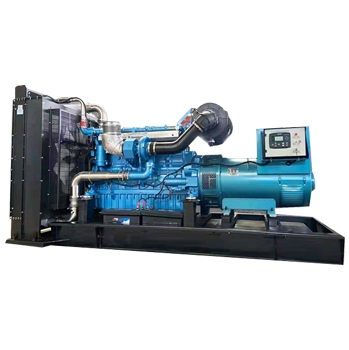Understanding Generator Sets: Powering Your Needs Efficiently
Jun 16,2025
Generator sets, commonly referred to as gensets, are an integral part of the electrical power landscape. They serve as a dependable source of electricity, especially in locations where the grid supply is unreliable or entirely absent. Gensets convert mechanical energy into electrical energy, making them invaluable for a multitude of uses ranging from construction sites to emergency power supply fo

Generator sets, commonly referred to as gensets, are an integral part of the electrical power landscape. They serve as a dependable source of electricity, especially in locations where the grid supply is unreliable or entirely absent. Gensets convert mechanical energy into electrical energy, making them invaluable for a multitude of uses ranging from construction sites to emergency power supply for homes.
A typical generator set consists of an engine, an alternator, a fuel system, a voltage regulator, and various control panels. The engine, which can utilize various fuel types such as diesel, natural gas, or gasoline, drives the alternator. The alternator is responsible for converting the mechanical energy produced by the engine into electrical energy. The control panel manages the operation of the generator, ensuring that it functions smoothly and efficiently.
The primary advantage of using generator sets is their ability to provide immediate power in emergencies. This is particularly crucial for businesses that require uninterruptible power supply to maintain operations and safeguard sensitive electronic equipment. Additionally, gensets can be tailored to meet specific power requirements, ensuring the right balance of efficiency and output.
Generator sets are also widely used in construction and remote work sites, where grid electricity is not accessible. They enable workers to operate power tools, lighting, and other essential equipment, ensuring productivity remains high even in isolated locations. Furthermore, in agricultural settings, gensets can power irrigation systems and other machinery, enhancing the productivity of farms.
In terms of maintenance, regular checks and servicing are crucial to ensure the longevity and efficiency of a generator set. Routine maintenance includes oil changes, fuel system inspections, and testing the electrical output. By adhering to a maintenance schedule, operators can prevent unexpected failures and ensure optimal performance.
Moreover, advancements in technology have led to the development of more efficient and environmentally friendly generator sets. Modern gensets often include features like noise reduction systems and reduced emissions, making them a better option for environmentally conscious consumers.
In summary, generator sets play a vital role in providing reliable power across various sectors. Their ability to deliver uninterrupted electricity in emergencies, along with their versatility in applications, makes them indispensable. Understanding the components, benefits, and maintenance of generator sets can help users make informed decisions when selecting the right power solution for their needs. Whether for emergency backup, construction, or remote operations, generator sets offer a reliable and efficient means of powering daily activities.
A typical generator set consists of an engine, an alternator, a fuel system, a voltage regulator, and various control panels. The engine, which can utilize various fuel types such as diesel, natural gas, or gasoline, drives the alternator. The alternator is responsible for converting the mechanical energy produced by the engine into electrical energy. The control panel manages the operation of the generator, ensuring that it functions smoothly and efficiently.
The primary advantage of using generator sets is their ability to provide immediate power in emergencies. This is particularly crucial for businesses that require uninterruptible power supply to maintain operations and safeguard sensitive electronic equipment. Additionally, gensets can be tailored to meet specific power requirements, ensuring the right balance of efficiency and output.
Generator sets are also widely used in construction and remote work sites, where grid electricity is not accessible. They enable workers to operate power tools, lighting, and other essential equipment, ensuring productivity remains high even in isolated locations. Furthermore, in agricultural settings, gensets can power irrigation systems and other machinery, enhancing the productivity of farms.
In terms of maintenance, regular checks and servicing are crucial to ensure the longevity and efficiency of a generator set. Routine maintenance includes oil changes, fuel system inspections, and testing the electrical output. By adhering to a maintenance schedule, operators can prevent unexpected failures and ensure optimal performance.
Moreover, advancements in technology have led to the development of more efficient and environmentally friendly generator sets. Modern gensets often include features like noise reduction systems and reduced emissions, making them a better option for environmentally conscious consumers.
In summary, generator sets play a vital role in providing reliable power across various sectors. Their ability to deliver uninterrupted electricity in emergencies, along with their versatility in applications, makes them indispensable. Understanding the components, benefits, and maintenance of generator sets can help users make informed decisions when selecting the right power solution for their needs. Whether for emergency backup, construction, or remote operations, generator sets offer a reliable and efficient means of powering daily activities.





